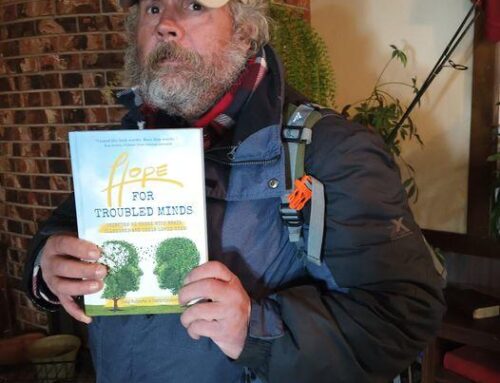Let me make this clear. Mental illness is not demon possession. If you are a faith leader and someone asks you to exorcise a friend or family member, don’t do it. What can you do instead? A good pastor friend of mine has shared with me a screening process to rule out lesser afflictions before one might consider a chronic diseased soul.
-
- Examine the environment. Take a particularly close look at the relationship dynamics of the person presented as the problem. Often families and other intimate groups target one member and poured all their disruptive thoughts and feelings into a scapegoat who responds with peculiar and sometimes even volatile behavior. It can be very difficult to examine the lives of those convinced they are only acting out of love. They may themselves become angry with you, even abusive. Be sure to tread lightly and have back up before you take these steps.
- Counsel the individual. Counseling is not the same as therapy. The purpose of spiritual counseling is not to dig deep into a person’s psyche. It is not to determine behavioral causes. It is to listen carefully and respond prayerfully. It is simple, yet profound. Sometimes it works miracles. Sometimes it does not.
- Refer to a therapist. Some believe “Christian counselors” are the only ones acceptable to counsel Christians. I sharply disagree. Anyone can profess faith and hang a shingle on his door that he provides Biblical counseling. I have found most of these to be woefully inadequate and sometimes even harmful. What we need is a fully accredited therapist who is respectful of our faith, who views it as a helpful tool for healing. I have the best of both worlds — not a Christian counselor, but a therapist who is a Christian.
- Consult a psychiatrist. Psychotropic medication can be very helpful in addressing imbalanced mood states and unpredictable behavior. It is not precise. Sometimes it takes months, even years to take effect. It does not produce an exhilarating high or induce a mellow peace. It simply takes the edge off so that a person can begin to address his problems.
- Connect them to a 12-step or other support group. Some run from reality and seek to self-medicate with alcohol and other drugs. This creates more suffering for self and misery for others. Studies show that over 50% of addicts struggle with an underlying mental illness. Where do we begin to treat someone with a dual diagnosis? This question is only beginning to be explored. In my own life journey, when I became clean and sober, the demons of my mental illness hit hard. Others address their mental illness first and take psychotropics. But if they have not become clean and sober, this is risky and can cause irreparable damage. The answer lies in a holistic approach, a commitment to what I call “prescribed sobriety,” taking only medicines a qualified psychiatrist provides and being diligent about twelve step work.
If these issues have been addressed and no progress results, it may require more intensive spiritual intervention. First, Christian leaders are called to pray in an intimate way with and for those who are sick in body, mind, and spirit. As Scripture says —
Is anyone among you sick? Let them call the elders of the church to pray over them and anoint them with oil in the name of the Lord. And the prayer offered in faith will make the sick person well; the Lord will raise them up. If they have sinned, they will be forgiven.Therefore confess your sins to each other and pray for each other so that you may be healed. The prayer of a righteous person is powerful and effective. (James 5:14-16)
Prayer with the pure intent to liberate a person held captive by bonds of addiction and other mental illnesses can indeed be powerful and effective. It may not produce ideal desired results, but it does have an impact both on the giver and receiver of prayer.
Finally, there are times when you diligently follow all of these steps and the person is still a danger to himself or others. At any point along the way that this is the case, you may need to call for legal intervention. Many Christians are reluctant to call on the police or take a person to court and it most certainly is a measure of last resort, but it may well be the only thing to save a person’s life. Restraint is sometimes the most loving thing we can do. And after we have done this, the most Christian thing to do is visit them in prison or in the psych hospital.
Once again, and I can’t stress this enough –MENTAL ILLNESS IS NOT DEMON POSSESSION. Having said that, there may be some common features in the two. Consider this story:
When Jesus got out of the boat, a man with an impure spirit came from the tombs to meet him. This man lived in the tombs, and no one could bind him anymore, not even with a chain. For he had often been chained hand and foot, but he tore the chains apart and broke the irons on his feet. No one was strong enough to subdue him. Night and day among the tombs and in the hills he would cry out and cut himself with stones. When he saw Jesus from a distance, he ran and fell on his knees in front of him. He shouted at the top of his voice, “What do you want with me, Jesus, Son of the Most High God? In God’s name don’t torture me!” For Jesus had said to him, “Come out of this man, you impure spirit!” (Mark 5:2-8)
Here Jesus encounters a man with an “impure spirit” unable to be contained, cutting himself with stones. The man had been excluded, or excluded himself from society, and was living in tombs like a dead man.
When he sees Jesus, the man (or rather, the demons within him) recognize a unique power about him. Jesus speaks directly to his affliction, calling on the unclean spirits to flee. Then, in an amazing and incredible way, Jesus commands the spirits to leave the man. Later we find him at peace, in his right mind, sharing his testimony of how Christ had healed him.
Though not indicative of demon possession, there are important parallels between this man’s story and those of us who have a serious mental illness. First, there is exclusion. Second, there is self-harm. And third, there is healing in an encounter with Christ.
First, exclusion can be powerful, strong enough to rob us of any connection with community. Such exclusion is frequently laid upon us by persons who fail to understand our illness and who are afraid. Ignorance breeds contempt and contempt fuels exclusion. The stigma that flows from this is all too often internalized. We begin to believe the press clippings that our life is not worth living and that we would be better off dead.
This death-dealing message leads to self-harm. For some this takes an almost identical version as the man’s — cutting. For others, it is more subtle, but just as damaging. Drinking and other drugs. Reckless living. Not eating, sleeping, or engaging in activities that contribute to good health. In some cases, the pinnacle of self-harm — suicide.
Yet, there is hope. The Spirit of Christ finds us among the living dead and addresses our needs directly. Jesus does not skirt the issue with this man. He doesn’t talk around the subject of his affliction, choosing instead to discuss the weather, sports, or the economy. Jesus invites even the damaging aspects of ourselves to come out into the open. It is through this openness that his festering wounds can breathe in refreshing air and begin to heal.
Discover more from Delight in Disorder
Subscribe to get the latest posts sent to your email.






